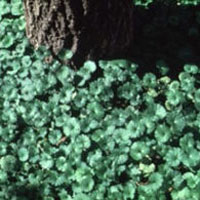Gotu Kola
 © Steven Foster
© Steven FosterParts Used & Where Grown
This plant grows in a widespread distribution in tropical, swampy areas, including parts of India, Pakistan, Sri Lanka, Madagascar, and South Africa. It also grows in Eastern Europe. The roots and leaves are used medicinally.
- Reliable and relatively consistent scientific data showing a substantial health benefit.
- Contradictory, insufficient, or preliminary studies suggesting a health benefit or minimal health benefit.
- For an herb, supported by traditional use but minimal or no scientific evidence. For a supplement, little scientific support.
Our proprietary “Star-Rating” system was developed to help you easily understand the amount of scientific support behind each supplement in relation to a specific health condition. While there is no way to predict whether a vitamin, mineral, or herb will successfully treat or prevent associated health conditions, our unique ratings tell you how well these supplements are understood by the medical community, and whether studies have found them to be effective for other people.
For over a decade, our team has combed through thousands of research articles published in reputable journals. To help you make educated decisions, and to better understand controversial or confusing supplements, our medical experts have digested the science into these three easy-to-follow ratings. We hope this provides you with a helpful resource to make informed decisions towards your health and well-being.
This supplement has been used in connection with the following health conditions:
| Used for | Amount | Why |
|---|---|---|
Chronic Venous Insufficiency | 60 to 120 mg daily of a standardized herbal extract | Gotu kola extracts have been found to be successful in treating CVI in preliminary trials. |
Skin Ulcers | Apply an ointment or powder containing 1 to 2% herbal extract daily | Gotu kola extracts may be used topically to help speed wound healing. |
Wound Healing | Take a standardized herbal extract providing 60 mg total triterpenoids once or twice per day | Applying an ointment containing gotu kola may speed healing of skin wounds. |
Burns | Refer to label instructions | Gotu kola contains substances that inhibit scar tissue from forming, it has been used in the medicinal systems of central Asia for centuries to treat numerous skin diseases. |
Scars | Refer to label instructions | The primary active constituents of gotu kola may prevent excessive scar formation by inhibiting the production of collagen (the material that makes up connective tissue) at the wound site. |
Varicose Veins | Refer to label instructions | Supplementing with gotu kola may be helpful for varicose veins. |
Traditional Use (May Not Be Supported by Scientific Studies)
Gotu kola has been important in the medicinal systems of central Asia for centuries. In Sri Lanka, it was purported to prolong life, as the leaves are commonly eaten by elephants. Numerous skin diseases, ranging from poorly healing wounds to leprosy, have been treated with gotu kola. Gotu kola also has a historical reputation for boosting mental activity and for helping a variety of illnesses, such as high blood pressure, rheumatism, fever, and nervous disorders. Some of its common applications in Ayurvedic medicine include heart disease, water retention, hoarseness, bronchitis, and coughs in children, and as a poultice for many skin conditions.1
Copyright © 2025 TraceGains, Inc. All rights reserved.
Learn more about TraceGains, the company.
The information presented by TraceGains is for informational purposes only. It is based on scientific studies (human, animal, or in vitro), clinical experience, or traditional usage as cited in each article. The results reported may not necessarily occur in all individuals. Self-treatment is not recommended for life-threatening conditions that require medical treatment under a doctor's care. For many of the conditions discussed, treatment with prescription or over the counter medication is also available. Consult your doctor, practitioner, and/or pharmacist for any health problem and before using any supplements or before making any changes in prescribed medications. Information expires December 2025.
